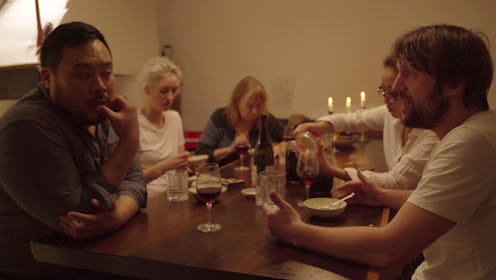Entertainment
This Netflix Foodie Docuseries Will Give You New Appreciation For Your Street Taco Truck

Celebrity chef David Chang's Netflix series Ugly Delicious premieres on Feb. 23 and proves that food is so much more than something to be eaten. Over the course of the show's first season, Chang and a number of food critics, chefs, and celebrity guests explore what cuisine means and how it communicates, even facilitating tough political conversations. Ugly Delicious (associate producer: Gillian Ferguson) is about culture as much as it is about food, and to Chang, that doesn't mean that "authentic" cuisine is any more valid than another culture's recreation.
The show's first episode focuses on pizza, and points out the divide between classes of pizza chefs. Various pizza traditionalists plead their case, including a member of the Associazione Vera Pizza Napoletana, an organization dedicated to "cultivate the culinary art of making Neapolitan pizza." The organization hands out a badge of approval to pizzerias that meet their prescribed requirements. The official AVPN rulebook states that there are only two types of pizza they recognize: Marinara (tomato, oil, oregano, and garlic) and Margherita (tomato, oil, mozzarella, grated cheese, and basil.) Based on their strict requirements, the AVPN would probably not approve of the Japanese-inspired seafood pizza that Chang eats early in the episode, or the smoked salmon pizza that celebrity chef Wolfgang Puck makes for Chang.
While the AVPN is serious about how pizza is supposed to be made, Chang takes umbrage with the concept of an "authentic" pizza, and the concept of authenticity in general. Pizza may be considered an Italian or Italian-American cuisine, Chang states that the best pizza he's ever had was in Tokyo, made by Japanese chefs using Japanese ingredients to create their own spin on Italian cuisine. Chang says in the documentary:
"It's not that I hate authenticity, I hate that people want this singular thing that is 'authentic.' There are people that are making Italian food that are more Italian in its idea and thesis than anyone is Italy is making, because they're not using anything that's imported. They're using anything that's around them."
Each episode of Ugly Delicious' (executive producer: Lisa Nishimura) first season hinges on a central question, such as whether it's more valuable to preserve an "authentic" recipe, or to leave tradition behind and forge one's own path. In examining the history of the foods he explores, Chang shows how centuries-old dishes became commonplace, suggests how food is central to keeping cultures alive and relevant, but also explains that he's more interested in seeing chefs eschew tradition and make meals inspired by their own personality and culture.
Chang and his guests take a look at several different cuisines, which are as specific as fried chicken and as broad as "home cooking" — but the show interviews multiple people with different perspectives to show how one type of cooking can be approached in different ways. These range from the ingredients, to the cultural influences, to the meaning and "thesis," as Chang puts it, behind one meal. Though he's an award-winning chef known for launching the Momofuku family of restaurants, Chang revealed to journalists at a Netflix press event that the focus of Ugly Delicious isn't to judge or criticize meals.
"We didn’t really do any prescriptive, like, you should eat this or this isn’t the best thing, blah blah blah," he said. "We wanted people to come up with their own opinions and then present the facts the best we could."
Chang doesn't communicate the objective quality of the meals he eats on Ugly Delicious, but instead conveys the cultural meanings and implications behind the food. The chef challenges the idea of cultural authenticity as it relates to food, while arguing that the culture that is credited with certain cuisine deserves to be respected and remembered.
He's very passionate about the idea of chefs trying new things, but Chang also communicates the importance of carrying a culture's history through food. Chang told journalists that he believes "we’re living in a world that many of the stories and many of the narratives that should be told aren’t being told." In the episode "Tacos," Chang shows how those narratives can be told through food as effectively as any television show or novel.
Ugly Delicious tracks the history of the taco as an easily accessible meal for workers in Mexico to its cultural permanence as the flagship food of Taco Bell to the Michelin Star restaurants that are elevating the street taco to critically acclaimed cuisine. Chang visits taco establishments everywhere from Los Angeles to Copenhagen to South Philadelphia, tracking how Mexican culture is able to travel with the food. During his taco-inspire journey, Chang speaks to multiple immigrants who work as chefs, some of whom have been deported or are at risk of deportation from America. As commonplace as the taco has become, there's tragedy in the fact that the culture that brought tacos to America faces such bias. At the same press event, Chang called food a "Trojan horse to talk about things that are sometimes easy to talk about and oftentimes difficult to talk about."
Each episode of Ugly Delicious begins as an episode about food, and slowly unravels to reveal that it's actually story about immigrants. The term "melting pot" is often used to describe America, and in Ugly Delicious, that that pot can be literal, combining flavors and influences from various cultures to create an exciting, innovative meal. As commercialized as the taco has become, Ugly Delicious suggests that the history of Mexican culture comes alive in some form whenever one eats a taco, just as the culture of Italy runs through pizza, exactly like how the Korean culture that Chang grew up with survives in a bowl of pho. Ugly Delicious shows that any great meal is really a story that you can taste.
Additional reporting by Dana Getz